John Hurrell – 19 February, 2012
DJN seems to base his practice on a constantly replenished sense of wonder that certain visually detectable items can make attractive, emotionally compelling sounds rich in association and private or public memory.
DJN is an Auckland artist and musician (part of the late-eighties band Drone) who for the opening of the above small exhibition presented an unusual bodily gestural performance, The Concrete Mix.
Obviously a concrete mixer was a key instrument in the presentation, the title punning on aural ‘mixing’ and ‘concrete’ for the abstract materiality of sound. No electronic amplification was used. The experience was solely acoustic and visual, different in intensity from the video that resulted, and held in a small living room (with sofas and chairs) that is part of the Audio Foundation complex - just round the corner from the back steps of St. Kevin’s Arcade.
Dressed in a white t-shirt and trousers, with sandshoes - almost like a gymnast - DJN’s activity consisted of retrieving vinyl records, old music videos, toy instruments, amplification equipment, speakers, and turntable parts from a cardboard box positioned at his feet, announcing their names to the audience - and hurling them into the mouth of the churning concrete mixer in the middle of the room. After about fifteen minutes, when he had emptied the box, he tipped the mixer’s fragmented and partially crushed contents onto the carpeted floor.
There are at least three ways of interpreting DJN’s actions. One is that they were about obsolete technology and how various machines and consumer goods eventually end up as landfill or in the tip. Another is that they were more about his own taste and emotional attachments, particularly with the musical works he throws into the mixer (eg. Peter Posa, Eddie Hodges, Dire Straits, Cliff Richard and the Shadows). The action seemed pointed and not just some bland historical account about digital advancement.
Another more abstract approach is that of musical expression (let’s say ‘interesting auditory sensations’ in the Cage tradition) created acoustically from the ground up vinyl, wire and metal bits and pieces: the rumbling clicks, rattles, scrapes, and groans emitted from the mixing barrel and amplified by its hollow shape.
On the Audio Foundation’s walls, DJN’s pencil drawings, photographs, sump-oil texts and readymade sculptures however are more about the processes of time than aural textural dynamics translated into visual form - they deal quite specifically with (the artist’s) memory and feeling: often small pieces of sound equipment he used with Drone or evocative lines from songs by bands he loves like Joy Division, The Gordons, and Tackhead.
The pencil drawings (usually rubbings from records surrounded by the names of different tenses) lack sufficient surface intricacy and tonal depth to hold your interest for too long, but the metal pieces of PA equipment look amazingly elegant projecting from a white wall. I thought the performance worked well as an enigmatic statement about the past and memory, and of the seventeen wall works, the highlight is 15.02.09, a strange oil stained cardboard box that once carried a kick drum pedal. On it is written in large letters ‘Kik’. The work connects with another performance DJN did for a festival Andrew Clifford organised for the Gus Fisher in 2008 where he relentlessly kicked a soccer ball against an upright piano - drumming and piano ‘playing’ combined.
The sump-oil texts draw out the use of oil as a metaphor for language that works as a lubricant to encourage values that drive both the socially generous (My words are for all from the assassin Hassan I Sabbah as interpreted by William Burroughs), and the mystical or private (Listen to the silence, let it ring on - from Joy Division.)
Three other text works on paper use overlapping, repeated, coloured letters to merge words together in a bizarre but intriguing elongated format, blending for example, feedback into fortissimo, so near into sonar, and cymbal into chime to create a variation of futurist poetry that sounds aural as much as being visual. DJN seems to base his practice on a constantly replenished sense of wonder that certain visually detectable items can make attractive, emotionally compelling sounds rich in association and private or public memory.In that sense his images of records are like the very clever oil paintings of playing records by Michael Morley, except DJN’s are specific and indexical, directly correlating with the physical object and celebrating the resulting traces.
John Hurrell
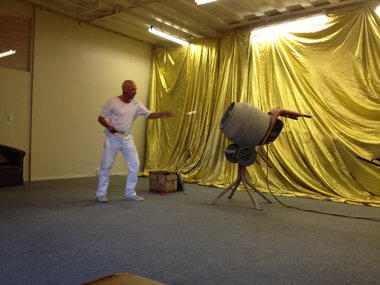
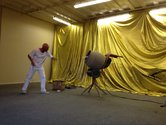
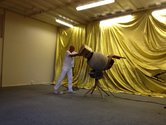
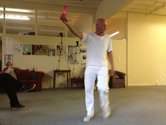
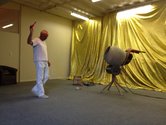
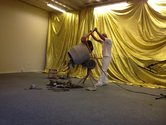
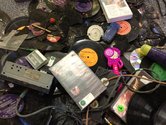
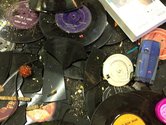
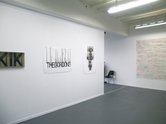
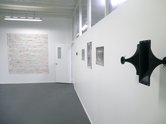
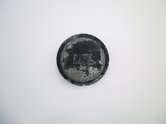
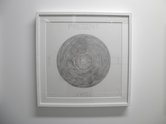
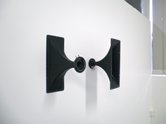
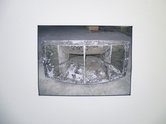
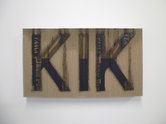
 Two Rooms presents a program of residencies and projects
Two Rooms presents a program of residencies and projects Advertising in this column
Advertising in this column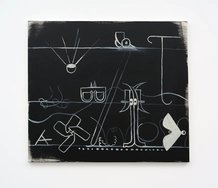
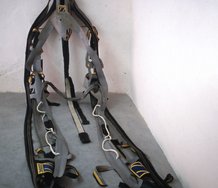
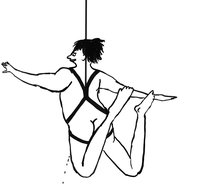
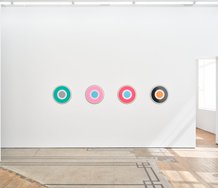
This Discussion has 0 comments.
Comment
Participate
Register to Participate.
Sign in
Sign in to an existing account.